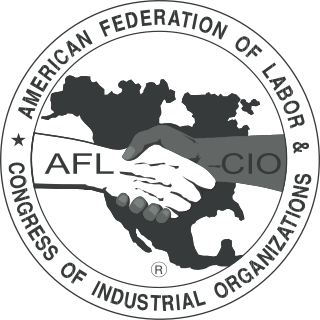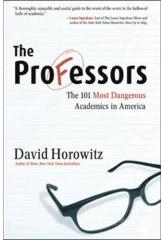Related Research Articles

David Joel Horowitz is an American conservative writer. He is a founder and president of the right-wing David Horowitz Freedom Center (DHFC); editor of the Center's far-right website FrontPage Magazine; and director of Discover the Networks, a website that tracks individuals and groups on the political left. Horowitz also founded the organization Students for Academic Freedom.

The American Federation of Labor and Congress of Industrial Organizations (AFL–CIO) is the largest federation of unions in the United States. It is made up of 56 national and international unions, together representing more than 12 million active and retired workers. The AFL–CIO engages in substantial political spending and activism, typically in support of liberal or progressive policies.

Social Democrats, USA (SDUSA) is a small political association of social democrats founded in 1972. The Socialist Party of America (SPA) had stopped running independent presidential candidates and consequently the term "party" in the SPA's name had confused the public. Replacing the socialist label with "social democrats," was meant to disassociate the ideology of SDUSA with that of the Soviet Union.

John Joseph Sweeney was an American labor leader who served as president of the AFL-CIO from 1995 to 2009.

William George Meany was an American labor union leader for 57 years. He was the key figure in the creation of the AFL-CIO and served as the AFL-CIO's first president, from 1955 to 1979.
Academic freedom is a moral and legal concept expressing the conviction that the freedom of inquiry by faculty members is essential to the mission of the academy as well as the principles of academia, and that scholars should have freedom to teach or communicate ideas or facts without being fear of repression, job loss, or imprisonment. While the core of academic freedom covers scholars acting in an academic capacity - as teachers or researchers expressing strictly scholarly viewpoints -, an expansive interpretation extends these occupational safeguards to scholars' speech on matters outside their professional expertise. It is a type of freedom of speech.
The American Association of University Professors (AAUP) is an organization of professors and other academics in the United States. AAUP membership includes over 500 local campus chapters and 39 state organizations.
Florida House Bill H-837, also known as HB-837 or The Academic Freedom Bill of Rights, was a proposed bill in 2005 that would have allowed students to establish lawsuits against their professors and university for perceived intolerance of the student's beliefs. The bill could have also required professors to teach concepts that may have contradicted established facts, if the concept was considered a "serious scholarly" theory.
Thomas Reilly Donahue, who served as Secretary-Treasurer of the American Federation of Labor and Congress of Industrial Organizations from 1979 to 1995, President in 1995, and President Emeritus since 1996, is one of the most influential leaders of the post-World War II American trade union movement.
Tenure is a category of academic appointment existing in some countries. A tenured post is an indefinite academic appointment that can be terminated only for cause or under extraordinary circumstances, such as financial exigency or program discontinuation. Tenure is a means of defending the principle of academic freedom, which holds that it is beneficial for society in the long run if scholars are free to hold and examine a variety of views.

The Professors: The 101 Most Dangerous Academics in America is a 2006 book by conservative American author and policy advocate David Horowitz. Contending that many academics in American colleges hold anti-American perspectives, Horowitz lists one hundred examples who he believes are sympathetic to terrorists and non-democratic governments.

The National Coalition Against Censorship (NCAC), founded in 1974, is an alliance of 50 American non-profit organizations, including literary, artistic, religious, educational, professional, labor, and civil liberties groups. NCAC is a New York-based organization with official 501(c)(3) status in the United States. The coalition works to defend freedom of thought, inquiry, and expression from censorship and threats of censorship through education and outreach, and direct advocacy. NCAC assists individuals, community groups, and institutions with strategies and resources for resisting censorship and creating a climate hospitable to free expression. It also encourages the publicizing of cases of censorship and has a place to report instances of censorship on the organization's website. Their annual fundraiser is called the Free Speech Defender Awards. The main goal of the organization is to defend the first amendment, freedom of thought, inquiry, and expression. NCAC's website contains reports of censorship incidents, analysis and discussion of free expression issues, a database of legal cases in the arts, an archive of NCAC's quarterly newsletter, a blog, and Censorpedia, a crowdsourced wiki. In fiscal year 2017, the organization earned a 95.93% rating by Charity Navigator, an organization that assesses the efficacy of nonprofits.
David T. Beito is a historian and professor of history at the University of Alabama.
The Leadership Conference on Civil and Human Rights, formerly called the Leadership Conference on Civil Rights, is an umbrella group of American civil rights interest groups.
The Labor Council for Latin American Advancement (LCLAA) is a nonprofit, nonpartisan Latino organization affiliated with the AFL-CIO and the Change to Win federation. It was founded in 1972 to provide Latino trade union members in the United States with a more effective voice within the AFL-CIO, to encourage Latino participation in the democratic process, and to encourage the organization of Latino workers into labor unions.

The Department for Professional Employees, AFL–CIO (DPE) is a semi-autonomous "trade" department of the AFL-CIO, and serves as an advocate for professional workers within the federation, and before legislative bodies, the press and the public.
Academic freedom at Brigham Young University (BYU) has been the subject of several controversies, mostly focusing on its religious nature. In 1992, BYU issued a statement limiting academic freedom in certain areas, including language that attacked The Church of Jesus Christ of Latter-day Saints, and language that violates the university's honor code.

Tom David Kahn was an American social democrat known for his leadership in several organizations. He was an activist and influential strategist in the Civil Rights Movement. He was a senior adviser and leader in the U.S. labor movement.
The Confucius Institute (CI) program, which began establishing centers for Chinese language instruction in 2004, has been the subject of criticisms, concerns, and controversies during its international expansion.
References
- ↑ "Reports & Publications: Academic Bill of Rights". AAUP. December 2003. Retrieved 9 October 2016.
- ↑ Intelligent Design: Teach the Controversy? Archived 2006-09-10 at the Wayback Machine Dann P. Siems, Assistant Professor Biology & Integrative Studies, Bemidji State University
- ↑ Pharyngula::Bachmann and Horowitz and the "Academic Bill of Rights" Archived December 9, 2007, at the Wayback Machine
- ↑ David T. Beito, K.C. Johnson, and Ralph E. Luker "The AHA's Double Standard on Academic Freedom" Perspectives, March 2006.
- ↑ "Resolution in Support of Academic Freedom". American Library Association official site. American Library Association. January 25, 2006. Retrieved June 11, 2014.
- ↑ "Opposition to the So-called Academic Bill of Rights and Support for the Campaign for Free Exchange on Campus". American Federation of Teachers official website. American Federation of Teachers. 2006. Retrieved June 11, 2014.
- ↑ ""Academic Bill Of Rights" – A Wolf in Sheep's Clothing". National Coalition Against Censorship official website. National Coalition Against Censorship. Retrieved June 11, 2014.
- ↑ "Opposition to the Misnamed "Academic Bill of Rights"". AFL-CIO official website. AFL-CIO. February 27, 2006. Retrieved June 11, 2014.